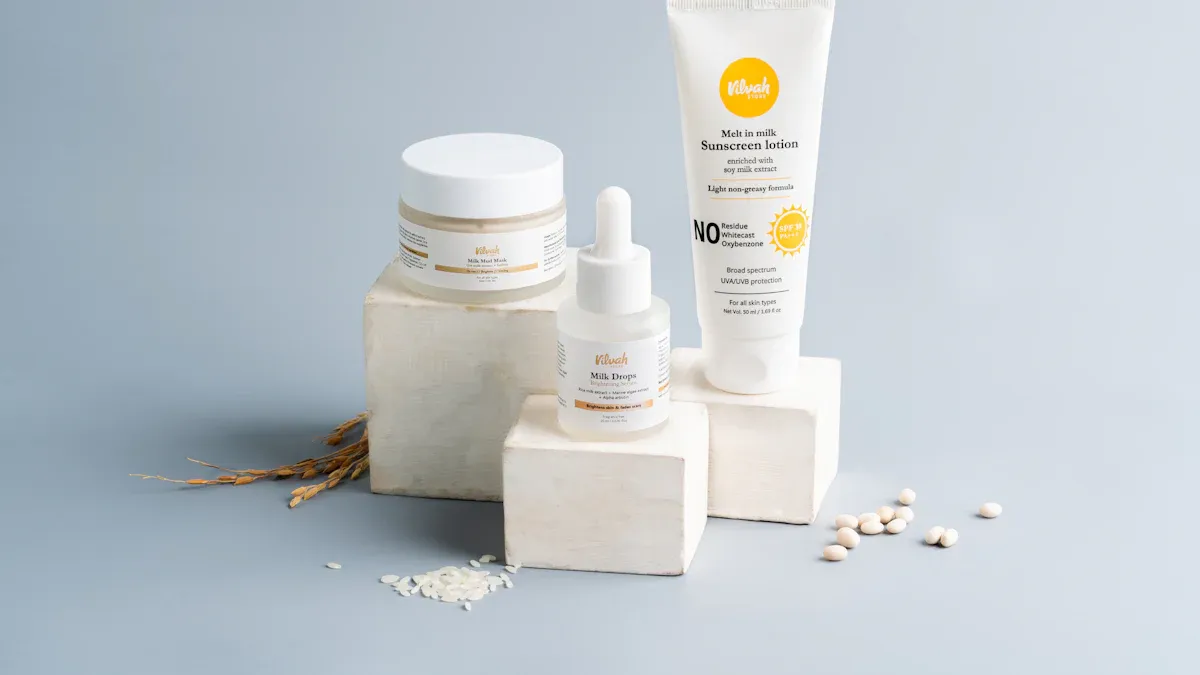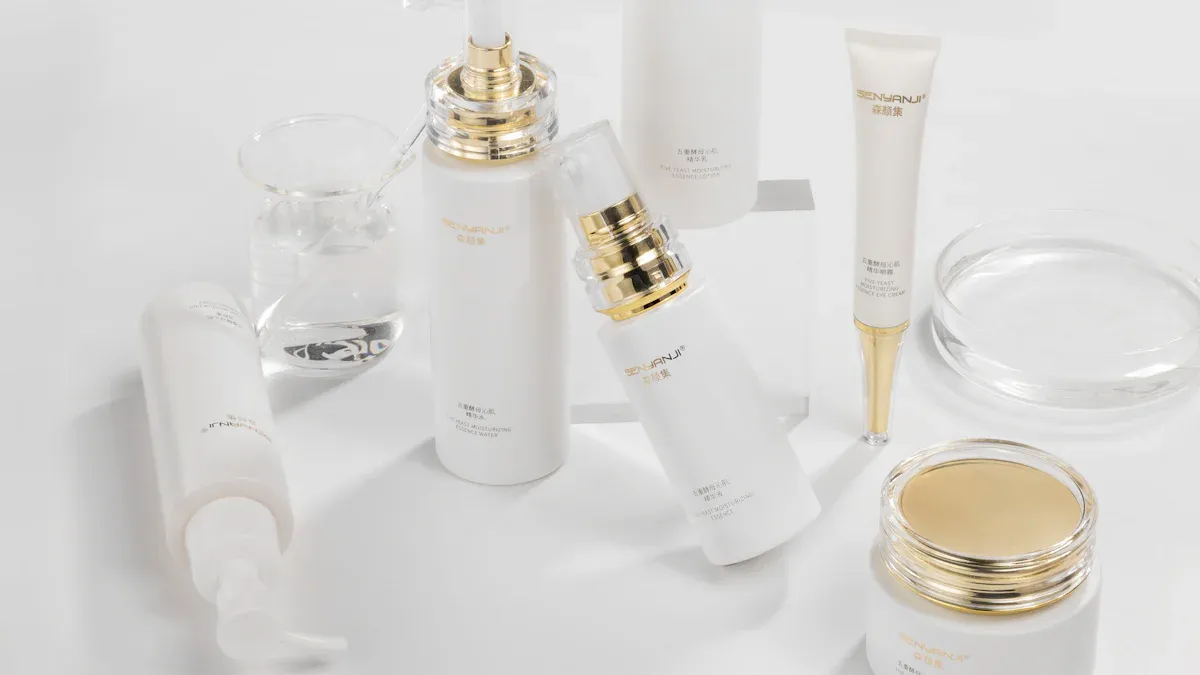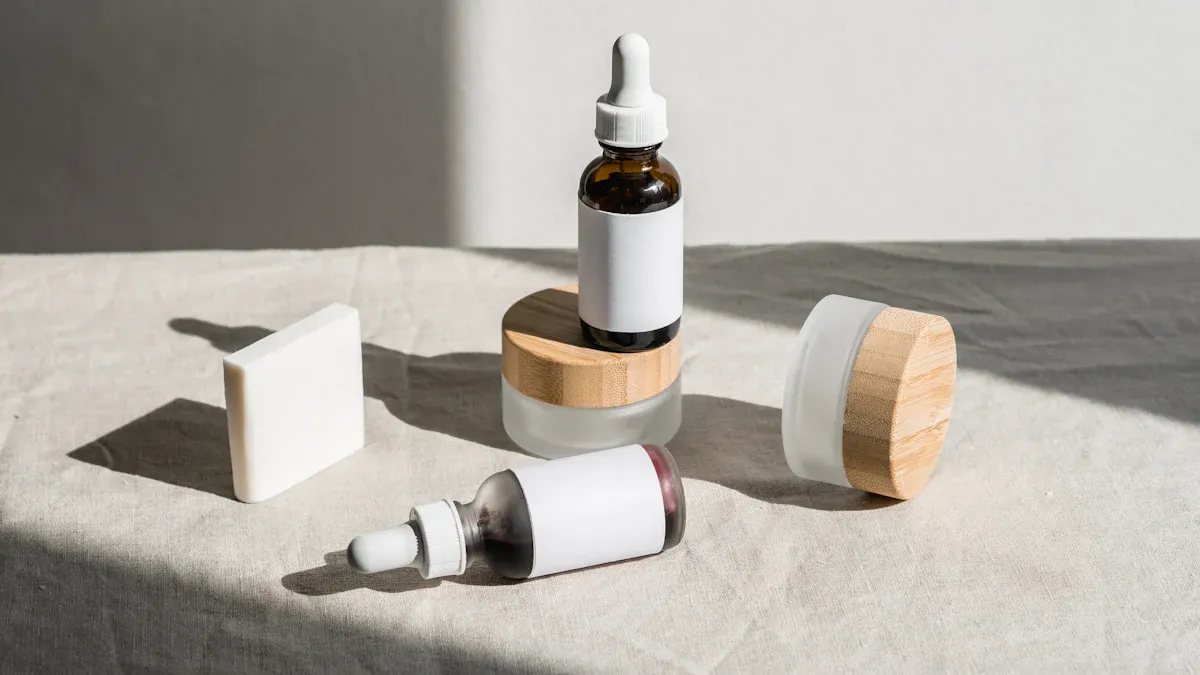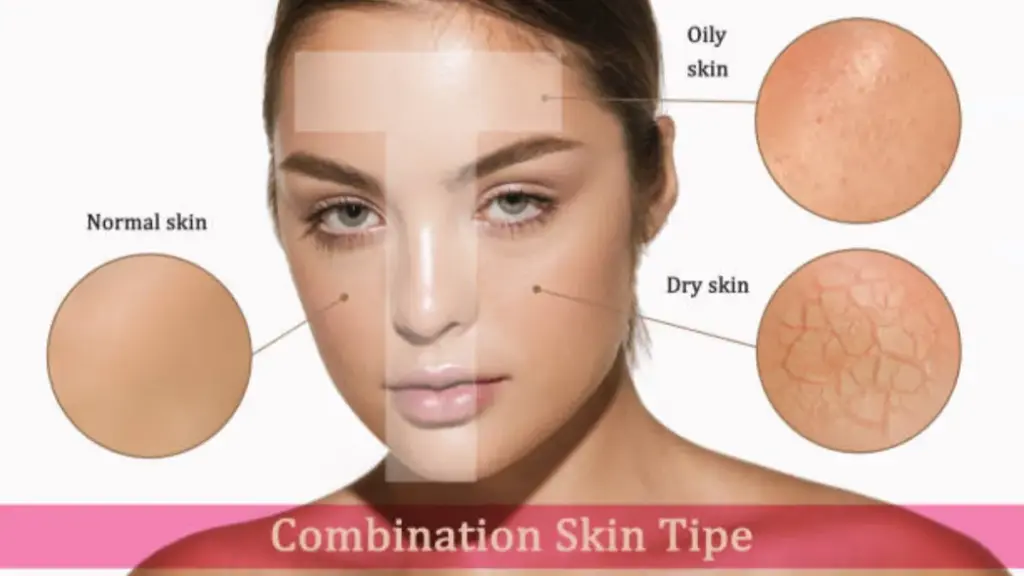
Meeting customer expectations in private label cosmetics is more important than ever. Customers want products that feel personal, high-quality, and aligned with their values. For example, millennials often choose eco-friendly options, with 29% basing decisions on online reviews. By focusing on customization and building trust, you can create a customer experience that fosters loyalty and satisfaction.
Understanding Customer Expectations
Why Customer Expectations Are Crucial in Private Label Cosmetics
Understanding customer expectations is the foundation of success in private label cosmetics. When you know what your customers want, you can create products that resonate with them. This connection builds trust and loyalty, which are essential for long-term growth. For example, analyzing consumer demographics helps you target specific groups, like eco-conscious millennials or skincare enthusiasts seeking premium formulations.
Tip: Use market research to uncover what matters most to your audience. Whether it’s affordability, sustainability, or luxury, aligning your products with their values ensures you’re meeting their expectations.
A deeper understanding of customer expectations also helps you differentiate your brand. Competitor analysis reveals gaps in the market, giving you opportunities to stand out. By offering unique solutions, you can position your private label cosmetics as the go-to choice for your target audience.
Key Factors Shaping Customer Expectations in Beauty
Several factors influence how customers perceive beauty products. These include emotional connections, social influences, and the perceived value of your offerings. Here are some key elements shaping expectations:
Brand Loyalty: Customers often stick to brands they trust. High-quality products and consistent messaging strengthen this bond.
Price Sensitivity: Many consumers balance their desire for premium skincare with affordability. Offering value for money can make your products more appealing.
Product Quality: Ingredients and manufacturing processes play a big role in shaping expectations. Customers want skincare that delivers results without compromising safety.
Social Influence: Recommendations from friends, family, and influencers drive purchasing decisions. Younger consumers, in particular, rely heavily on social media for product insights.
By addressing these factors, you can create private label skincare that meets customer expectations and builds lasting relationships.
The Impact of Trends and Personalization on Customer Satisfaction
Trends and personalization are game-changers in the beauty industry. Customers love products that feel tailored to their needs and preferences. Brands that excel at personalization generate 40% more revenue than their competitors. This shows how impactful it can be to offer customized skincare solutions.
Note: Personalization isn’t just about products. It’s about creating a customer experience that feels unique. For instance, personalized discounts or rewards can boost engagement by 80%.
Trends also play a huge role in shaping customer satisfaction. Social media influencers drive 67% of beauty enthusiasts to explore new products. Staying ahead of trends, like clean beauty or multi-functional skincare, ensures your private label cosmetics remain relevant.
Statistic | Description |
|---|---|
40% more revenue | Brands excelling at personalization outperform competitors significantly. |
67% | Consumers rely on influencers for product recommendations. |
80% | Customers prefer brands offering personalized experiences. |
By combining trend awareness with personalization, you can create skincare products that not only meet expectations but exceed them. This approach fosters loyalty and positions your brand for sustainable growth.
Strategies to Understand Customer Needs
Conducting Market Research to Identify Preferences
Market research is your compass when it comes to understanding what your customers want. It helps you uncover preferences, behaviors, and trends that shape purchasing decisions. By using proven methodologies, you can gather reliable data to guide your product development.
Methodology | Description |
|---|---|
Consumer Surveys | Collects data on preferences, buying habits, and satisfaction levels. |
Focus Groups | Offers insights into customer attitudes and motivations through group discussions. |
In-Depth Interviews | Provides detailed feedback on products and trends through one-on-one conversations. |
Market Segmentation Studies | Identifies distinct customer groups for targeted marketing and product strategies. |
Product Testing and Concept Testing | Evaluates product performance and customer reactions before launch. |
Finding the right private label manufacturer becomes easier when you know what your audience values. Whether it’s eco-friendly packaging or innovative formulations, market research ensures your products align with customer expectations.
Collecting and Analyzing Customer Feedback
Customer feedback is a goldmine for improving your private label beauty products. Surveys, reviews, and direct communication reveal what’s working and what needs improvement. For example, analyzing feedback can highlight gaps in your offerings or inspire new product ideas.
Evidence Type | Description |
|---|---|
Surveys | Provides measurable data for understanding customer preferences. |
Key Metrics | Helps identify trends and actionable insights through statistical analysis. |
Informed Iteration | Guides product updates by addressing customer needs and market gaps. |
Feedback Loop | Builds a connection between your brand and customers, enhancing satisfaction and loyalty. |
By creating a feedback loop, you show customers that their opinions matter. This not only improves your products but also strengthens trust in your brand.
Monitoring Competitors and Industry Trends
Keeping an eye on competitors and trends helps you stay ahead in the private label beauty market. It’s not just about copying what others do—it’s about finding opportunities to innovate and differentiate your brand.
Tracking Customer Acquisition Cost (CAC) and Customer Lifetime Value (CLV) reveals how well your retention strategies work.
Monitoring Customer Retention Rate shows how satisfied your customers are with your products.
Analyzing market share helps you measure your brand’s growth compared to competitors.
Companies with higher market share often enjoy 30% higher profit margins, proving the value of staying competitive.
Finding the right private label manufacturer who understands these dynamics can give you a significant edge. They can help you adapt to trends and deliver products that resonate with your audience.
Emphasizing Quality in Private Label Cosmetics

Importance of High-Quality Formulations and Ingredients
When it comes to private label cosmetics, the quality of your formulations can make or break your brand. Customers expect skincare that delivers results without compromising their health. That’s why using high-quality ingredients is non-negotiable. Whether it’s a soothing moisturizer or a rejuvenating serum, the right formulations can set your products apart.
Developing winning formulations starts with understanding what your audience values. Are they looking for natural ingredients? Do they prefer cruelty-free options? By answering these questions, you can create products that align with their expectations. For example, plant-based extracts and vitamins often appeal to eco-conscious consumers.
Partnering with a reliable manufacturer is key to ensuring consistent quality. A good manufacturer will have expertise and innovation in skincare, helping you craft products that meet industry standards. They’ll also guide you through the process of quality control, ensuring every batch meets your brand’s promise.
Tip: Highlight the benefits of your ingredients on your packaging. Customers love knowing what makes your products effective.
Ensuring Packaging Reflects Brand Values and Quality Standards
Packaging does more than protect your products—it tells your brand’s story. Customers often judge a product’s quality based on its packaging. If your packaging feels cheap or unclear, they might assume the product inside isn’t worth their money. On the other hand, creating eye-catching packaging with premium materials can elevate your brand’s image.
Studies show that consumers associate nicer packaging with high-quality products. For instance:
Clear or flimsy packaging often signals lower-end products.
Unique designs or metal finishes suggest luxury and higher efficacy.
Customers link higher costs to better quality when packaging looks premium.
When designing your packaging, think about your brand values. If sustainability is important to your audience, consider eco-friendly materials. If you’re targeting a luxury market, invest in sleek, modern designs. A skilled manufacturer can help you balance aesthetics with functionality, ensuring your packaging aligns with your brand’s identity.
Note: Packaging isn’t just about looks. It also needs to protect your products and comply with safety regulations.
Meeting Safety and Regulatory Requirements
Safety is the cornerstone of trust in private label skincare. Customers want to feel confident that your products are safe to use. Meeting safety and regulatory requirements isn’t just a legal obligation—it’s a way to build credibility with your audience.
A reputable manufacturer will guide you through the maze of safety standards. They’ll ensure your products comply with FDA, ISO, and cGMP certifications. This includes everything from sourcing safe ingredients to maintaining clean production facilities.
Quality control plays a huge role here. Regular testing ensures your formulations meet safety standards before they hit the shelves. This process also helps you avoid costly recalls or damage to your brand’s reputation.
Reminder: Always include clear labeling on your products. Customers appreciate transparency about ingredients and usage instructions.
By emphasizing quality in every aspect—from formulations to packaging to safety—you can create private label cosmetics that customers trust and love. This commitment to excellence not only meets expectations but also sets your brand up for long-term success.
Branding and Marketing to Align with Customer Expectations

Building a Brand That Resonates with Target Audiences
Creating a unique brand identity is essential for standing out in the competitive beauty market. Your brand should reflect the values and aspirations of your target audience. Think about what makes your private label cosmetics special. Is it sustainability, affordability, or luxury? By focusing on these elements, you can build a strong brand strategy that connects with your customers on a deeper level.
Successful brands like Dove and Fenty Beauty have shown the power of effective marketing by aligning their messaging with cultural relevance and inclusivity. Dove’s “Real Beauty” campaign resonated with consumers by promoting body positivity, while Fenty Beauty redefined inclusivity in the beauty industry. These examples highlight how emotional connections and authenticity can foster loyalty and trust.
Consistency is another key factor. From your logo to your packaging and social media presence, every touchpoint should reinforce your brand identity. This creates a cohesive experience that customers recognize and value.
Communicating Unique Value Propositions Effectively
Your unique selling proposition sets you apart from competitors. It’s the reason customers choose your products over others. To communicate this effectively, focus on what makes your private label cosmetics different. Highlight benefits like high-quality ingredients, eco-friendly packaging, or innovative formulations.
Clear and concise messaging is crucial. Use your website, social media, and product labels to emphasize your unique brand identity. For example, if your products are cruelty-free, make that a central part of your marketing strategy. Customers appreciate transparency and are more likely to trust brands that openly share their values.
Personalized marketing can also amplify your message. Tailored email campaigns and loyalty programs not only boost engagement but also show customers that you understand their needs. Studies reveal that personalized emails can increase revenue by 15%, proving the power of effective marketing.
Leveraging Digital Marketing to Enhance Visibility
Digital marketing is a game-changer for private label cosmetics. Platforms like Instagram and TikTok allow you to reach a global audience and showcase your products in creative ways. Brands like Glossier have built communities through digital platforms, turning customers into loyal advocates.
Incorporating technology into your marketing strategy can also drive results. Virtual try-on features, for instance, have been shown to increase conversion rates by 2.5 times. This not only enhances the shopping experience but also builds trust in your brand.
Omnichannel integration is another powerful tool. By ensuring a seamless experience across online and offline platforms, you can meet customer expectations and foster loyalty. Whether they’re shopping on your website or in a store, customers should feel connected to your brand identity.
Inclusive marketing is equally important. Fenty Beauty’s success demonstrates how embracing diversity can elevate your brand’s visibility and reputation. By celebrating individuality, you can create a unique selling proposition that resonates with a broader audience.
Tip: Use analytics to track the performance of your campaigns. This helps you refine your approach and stay ahead of trends.
Enhancing the Customer Experience
Providing Transparent and Clear Communication
Clear communication builds trust and strengthens your relationship with customers. When you’re upfront about your products, sourcing, and sustainability efforts, customers feel more confident choosing your private label skincare. For example, Dove’s “Real Beauty” campaign showed how authentic messaging could resonate with audiences. By celebrating diversity, Dove increased its market share by 30%.
Transparency also means being honest during challenges. If there’s a delay or issue, explain what happened and why. Customers appreciate honesty over silence. Regular feedback loops can also help. By asking for opinions and acting on them, you show customers that their voices matter.
Tip: Share real customer stories or reviews. These create a sense of authenticity and help build loyalty.
Offering Responsive and Reliable Customer Support
Exceptional customer service is a cornerstone of a great customer experience. Quick responses and effective solutions make customers feel valued. Metrics like resolution time and first reply time are crucial here. Did you know that 73% of customers prioritize fast resolutions? This highlights the importance of being prompt and efficient.
To improve your support, consider tools like chatbots or AI-driven systems. These can handle simple queries, leaving your team free to focus on complex issues. Personalized support also makes a difference. Addressing customers by name or referencing past interactions shows that you care about their experience.
Metric | Description | Importance |
|---|---|---|
Resolution time | The time taken to solve a customer issue. | 73% of customers prioritize fast resolutions for a good service experience. |
First reply time (FRT) | The time taken for an agent to respond to a support request. | Long wait times can indicate inefficiencies in support processes. |
Customer satisfaction | A score derived from customer surveys regarding their support experience. | Directly correlates with customer loyalty and satisfaction. |
Ensuring Seamless Post-Purchase Services
The customer journey doesn’t end after a purchase. Post-purchase services play a huge role in building loyalty. Regularly gathering feedback ensures your private label cosmetics meet expectations. Personalized nudges, like reminders to reorder or loyalty rewards, make customers feel appreciated.
Interactive experiences can also enhance satisfaction. For instance, some brands use thank-you pages to offer curated product suggestions. This not only engages customers but also encourages repeat purchases. Gamification elements, like earning points for reviews, add a fun twist to the experience.
Strategy | Description | Impact on Loyalty |
|---|---|---|
In-app Engagement | A coffee chain sends notifications for loyalty points and personalized offers immediately after purchase. | Enhances customer engagement and promotes brand loyalty. |
Interactive Experiences | Rokt transforms thank you pages into interactive experiences with curated suggestions. | Increases post-purchase satisfaction and fosters lasting relationships. |
By focusing on these aspects, you can create a customer experience that stands out. Whether it’s through transparent communication, exceptional customer service, or thoughtful post-purchase touches, every effort counts in building trust and loyalty.
Meeting customer expectations is the key to thriving in private label cosmetics. When you prioritize quality, branding, and customer experience, you build trust that keeps customers coming back. These strategies aren’t just about selling products—they’re about creating connections.
Oully can help you bring your vision to life. Their expertise ensures your brand delivers on promises and exceeds expectations.
FAQ
What is private label beauty?
Private label beauty refers to products manufactured by one company but sold under another brand’s name. You can customize formulations, packaging, and branding to match your vision.
How can I ensure my private label products meet customer expectations?
Focus on quality, personalization, and transparency. Partner with a trusted manufacturer like Oully to create high-quality, customized products that align with your customers’ needs.
Tip: Regularly gather feedback to refine your offerings and stay ahead of trends.
Why should I choose Oully for private label manufacturing?
Oully offers customizable solutions, fast production, and sustainable practices. Their expertise ensures your products meet industry standards and exceed customer expectations.
















